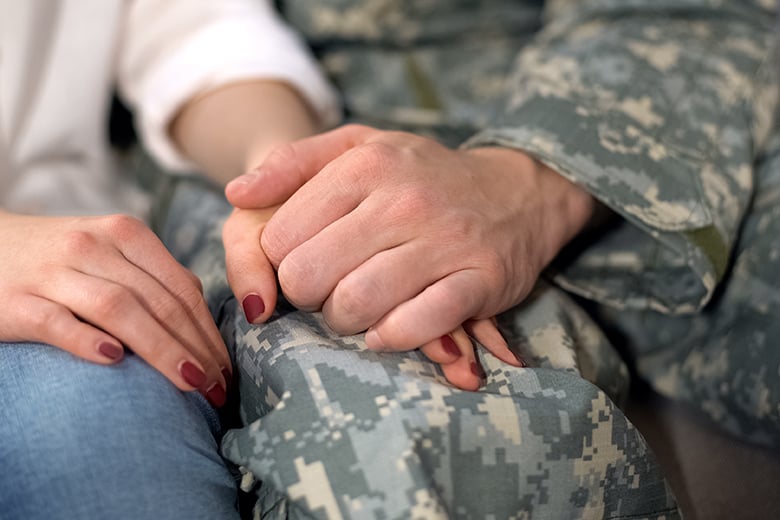There are many VA benefits a spouse is eligible for, but not everyone is eligible for the designation of “spouse.” While what constitutes a valid marriage is usually left up to the individual 50 states, the VA does have its own interpretations and can add or subtract requirements in certain circumstances. This brief article will highlight some anomalies in the VA’s marriage requirements.
The VA defines the term marriage as meaning “a marriage valid under the law of the place where the parties resided at the time of marriage, or the law of the place where the parties resided when the right to benefits accrued.”[1] The VA defines the term spouse as meaning “a person of the opposite sex whose marriage to the veteran meets the requirements of § 3.1(j).”[2] Though the VA and Congress has not updated 38 C.F.R. § 3.50(a) and 38 U.S.C. § 101(31), the opposite sex requirement was invalidated when the Secretary of the VA announced the VA would no longer enforce it.[3]
Though the burden of proof the VA generally requires veterans and their dependents to meet regarding claims is the benefit of the doubt, in issues of marriage, the VA applies the burden of proof required by the pertinent state regarding the necessary facts to prove a valid marriage in that state. The Court held the VA had to apply the pertinent state’s, Alabama’s, clear and convincing proof burden as opposed to the VA’s benefit of the doubt burden regarding the facts necessary to prove a marriage valid.[4] If the pertinent state recognizes common law marriage, the VA will likewise recognize it. As with all states, the VA requires an affirmative divorce, death, or annulment to end a common law marriage. The is no common law divorce.
What If The State Does Not Recognize The Marriage?
In some circumstances, the VA will recognize a marriage for a surviving spouse even if the pertinent state would not recognize it as valid. 38 C.F.R. Section 3.52 states:
3.52 Marriages deemed valid.
Where an attempted marriage of a claimant to the veteran was invalid by reason of a legal impediment, the marriage will nevertheless be deemed valid if:
(a) The marriage occurred 1 year or more before the veteran died or existed for any period of time if a child was born of the purported marriage or was born to them before such marriage (see § 3.54(d)), and
(b) The claimant entered into the marriage without knowledge of the impediment, and
(c) The claimant cohabited with the veteran continuously from the date of marriage to the date of his or her death as outlined in § 3.53, and
(d) No claim has been filed by a legal surviving spouse who has been found entitled to gratuitous death benefits other than accrued monthly benefits covering a period prior to the veteran’s death.[5]
The requirement for the claimant to lack knowledge of the legal impediment is viewed in terms of what the claimant’s state of mind was at the time that the invalid marriage was contracted.[6] When the claimant submits some proof of marriage, as detailed in 38 C.F.R. § 3.2059(a), and meets the requirements under 38 C.F.R. § 3.52, that claimant’s “signed statement that he or she had no knowledge of an impediment to the marriage to the veteran will be accepted, in the absence of information to the contrary, as proof of that fact.”[7] The Court has held that repeated contradictory statements of why a claimant had no knowledge of the legal impediment to a valid marriage is a reasonable basis to not deem a marriage valid.[8] In Dedicatoria, the claimant’s 1987 marriage to the veteran was invalid because she was still married to a prior husband.[9] The Claimant asserted that she assumed her first marriage was null and void because her husband had been absent for seven years and was assumed dead.[10] On a separate occasion, she asserted that she believed her first marriage was null and void because her first husband married another person in 1982.[11] The problem is that 1982 was during the seven-year period she claimed her husband was assumed dead.[12]
Additional Requirements
For certain surviving spouse benefits, the claimant must meet additional requirements, such as be married for at least one-year or have a child with the spouse, or continuously cohabitate with the spouse. As expected, there are numerous exceptions to these rules. If you have questions about VA benefits and claims, give Grimes Teich Anderson a call now at 800-533-6845 and ask to speak to an attorney in our Veterans Law Department.
[1] 38 C.F.R. § 3.1(j).
[2] 38 C.F.R. § 3.50(a).
[3] Cardona v. Shinseki, 26 Vet. App. 472 (2014); see https://law.yale.edu/studying-law-yale/clinical-and-experiential-learning/our-clinics/veterans-legal-services-clinic/cardona-v-shinseki.
[4] Burden v. Shinseki, 727 F.3d 1161 (Fed. Cir. 2013).
[5] 38 C.F.R. § 3.52.
[6] Dedicatoria v. Brown, 8 Vet. App. 441, 444 (1995).
[7] 38 C.F.R. § 3.205(c).
[8] Dedicatoria, 8 Vet. App. at 443-444 (1995).
[9] Id at 442.
[10] Id at 444.
[11] Id.
[12] Id.
